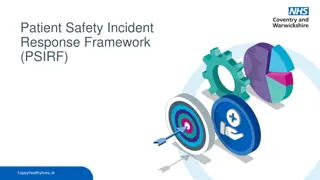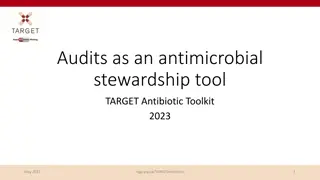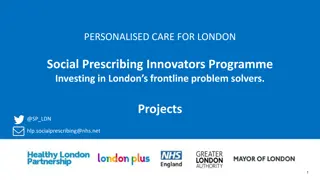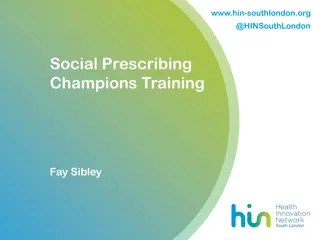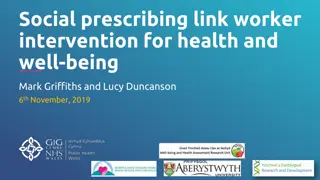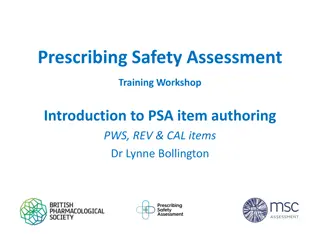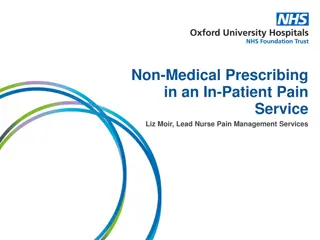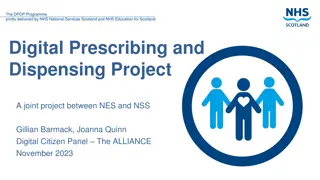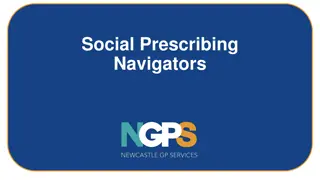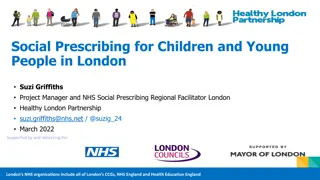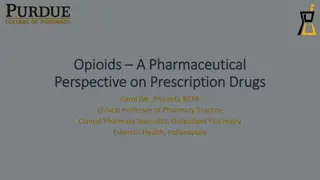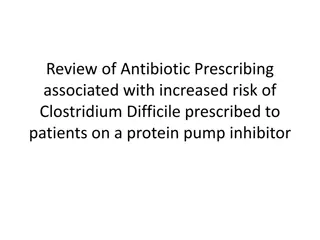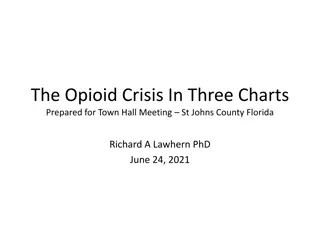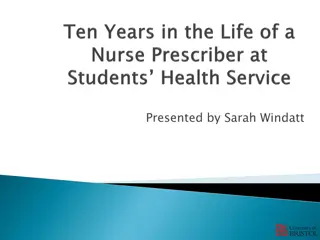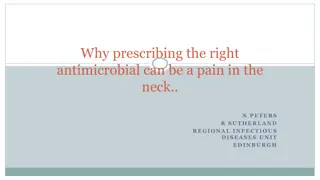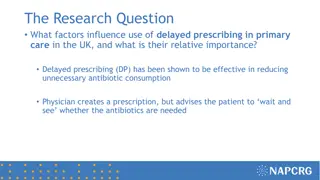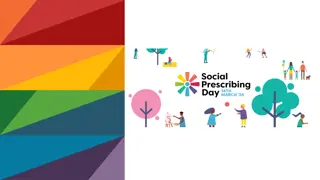Improving Prescribing Safety in Medical Practice
Professor Simon Maxwell's Prescribing Safety Assessment (PSA) aims to address concerns regarding junior doctors' readiness for prescribing medications. The assessment was developed in response to high error rates in prescribing, emphasizing the importance of safe medication practices to enhance patient care and minimize medication errors.
Download Presentation

Please find below an Image/Link to download the presentation.
The content on the website is provided AS IS for your information and personal use only. It may not be sold, licensed, or shared on other websites without obtaining consent from the author.If you encounter any issues during the download, it is possible that the publisher has removed the file from their server.
You are allowed to download the files provided on this website for personal or commercial use, subject to the condition that they are used lawfully. All files are the property of their respective owners.
The content on the website is provided AS IS for your information and personal use only. It may not be sold, licensed, or shared on other websites without obtaining consent from the author.
E N D
Presentation Transcript
SM Prescribing Safety Assessment Background, purpose and structure Professor Simon Maxwell, PSAMedical Director
SM Background
SM Prescribing medicines the most common intervention (for good or bad) that most doctors make to improve the health of their patients
SM Concerns about FY1 Prescribing Illing et al (2008) How prepared are medical graduates to begin practice? A comparison of three diverse UK medical schools. Prescribing considered to be the key problem Over 80% graduates failed a prescribing assessment Skills for Health Report (2009) Junior doctors in the NHS: Preparing medical students for employment and post-graduate training 65% of respondents considered prescribing was an issue EQUIP Study (2009) An in depth investigation into causes of prescribing errors by foundation trainees in relation to their medical education. 125,000 prescriptions in North-West England error rate 9% PROTECT Study (2011) 45,000 prescriptions in Scotland error rate 7%
General Medical Council - click for homepage SM An in depth investigation into causes of prescribing errors by foundation trainees in relation to their medical education. EQUIP study. Dornan et al, 2009 124,260 medication orders Available at http://www.gmc-uk.org/about/research/research_commissioned_4.asp
Safe Prescribing Working Group (2008) Clearly defined learning outcomes related to prescribing medicines A national e-Learning strategy to support students in reaching these outcomes A reliable assessment to enable students/schools can demonstrate that these learning outcomes have been met Unified prescription charts General Medical Council - click for homepage Improved training and access to the BNF Image:NHS.svg
SM Those competencies (and more) included in Outcomes for graduates 2018 (based on Tomorrow s Doctors 2009)
SM Purpose
Why a national prescribing assessment? Clinical governance/patient safety reasons Educational reasons No other validated, reliable and widely accepted measure of prescribing performance currently exists A national prescribing assessment: pools academic resources serves to raise and unify standards (drive learning) provides equity in assessment allows us to measure educational success
Prescribing Safety Assessment Developed jointly by MSC Assessment and British Pharmacological Society since 2010 Supported by input of other stakeholders such as GMC, NHS employers, Foundation programme, BMA medical students, Postgraduate Deans
SM PSA: Basic principles Should be passed before qualification and subsequent assumption of NHS prescribing responsibilities Designed for final year medical students Pass-fail assessment that can be repeated if necessary Delivered online from a central server Open book with access to the British National Formulary Assesses prescribing-related skills relevant to new doctors that map onto those in Outcomes for graduates 2015 Tests skills and deductive powers (as well as knowledge) Set at the level of early postgraduate practice
SM Development
SM PSA Governance MSC Assessment PSA Executive British Pharmacological Society Assessment Board Stakeholder Group Technical Group GMC Postgraduate Deans Project Team MSC-Assessment Alliance Work Stream 1 Work Stream 2 Work Stream 3 BMA Medical Students Committee ITEM BANK DELIVERY GUIDANCE NHS Employers Prescribing Safety Assessment Project Team is responsible for delivering the key work streams
SM Funding sources The PSA has received funding from: British Pharmacological Society MSC Assessment Department of Health NHS Education Scotland Health Education England
SM Structure
SM MED SURG ELD PED PSYCH O&G GP Prescribing Safety Assessment Section 1 Prescribing Section 8 Data Interpretation Section 2 Prescription Review 8 sections 60 items TOTAL = 120 mins (200 marks) Section 7 Drug Monitoring Section 3 Planning Management Section 6 Adverse Drug Reactions Section 4 Providing Information Section 5 Calculation Skills
SM Prescribing Safety Assessment Format Style Item Content Marks Prescribing 8 items of 10 marks 80 Prescription Review 8 items of 4 marks each 32 Planning Management 8 items of 2 marks each 16 Providing Information Calculation Skills 6 items of 2 marks each 8 items of 2 marks each 12 16 Adverse Drug Reactions 8 items of 2 marks each 16 Drug Monitoring Data Interpretation 8 items of 2 marks each 6 items of 2 marks each 16 12 TOTALS 60 200
SM Prescribing Safety Assessment Additional construction rules Coverage of clinical settings Minimum number of items Coverage of high risk drugs At least one item on Medicine 8 Surgery 4 Elderly care 8 Paediatrics 4 Psychiatry 4 Obstetrics & Gynaecol. 4 General practice 8 Opiates Anticoagulants Insulin Antibiotics Infusion fluids
SM Progress
SM PSA Progress Test delivery activity Item development activity Acad. year No of active PSA authors No. of peer- reviewed items in bank Med schools Candidates Comment 2010-11 0 0 2 200 Online pilot (30 items) 2011-12 60 600 8 1300 Online pilot (30 items) ~40 2012-13 1200 29 5000 Online pilot (60 items) 2013-14 27 1500 31 8000 Implementation + O seas schools 2014-15 46 1850 31 8000+ Implementation + O seas, FYP & NMPs 2015-16 92 2130 31 8000+ GMC statement re PSA & working in NHS 2016-17 100+ 2500 31 8000+
SM PSA2015: Student feedback This assessment was an appropriate test of the prescribing skills of a medical student upon graduation Q1 3.46 My course prepared me for the content of the questions in this assessment Q2 2.99 Q4 The time provided for answering the questions was sufficient Q5 The layout and presentation of the questions was easy to follow 2.41 3.88 Q6 The online interface was easy to use 3.90 The information (available prior to the event on prescribing- safetyassessment.ac.uk) about the PSA was useful Q7 3.90 Q8 3.51 The questions in the assessment were clear and unambiguous. Strongly agree = 5, agree = 4, neural = 3, disagree = 2, strongly disagree = 1
SM PSA2015: Student feedback Q3. The number of prescriptions that I have written on a prescription chart during my training is 0 5 25% 6 10 19% 11 20 24% 21 50 23% More than 50 9%
SM Summary Prescribing is a key clinical skill for all doctors There is evidence of poor prescribing practice amongst new graduates and others A reliable and valid assessment of competence is helpful for medical schools and the NHS, and serve to stimulate improved educational experiences for students The Prescribing Safety Assessment enables graduates to demonstrate that they have achieved a basic level of competence
SM Prescribing Safety Assessment Quality control, peer review and delivery Professor Simon Maxwell, PSAMedical Director
SM Work streams Question item bank development Online delivery platform Guidance and communications
SM Quality control
SM Item Bank and Test Development Now have over 100 trained authors Question item authors have diverse backgrounds Medical Schools British Pharmacological Society Clinical pharmacy Items submitted to PSA online system
Authoring Editing Quality assurance Item bank Assessment construction Assessment events Psychometric analysis Drug bank
SM Item development cycle Items commissioned from trained authors (Sept Dec) Peer review event over 2 days in Birmingham (May) PSA question papers constructed (September) Assessment Board meeting (November) Standard Setting meeting (January) PSA events in medical schools (Feb June)
SM Delivery
SM Guidance and Communication
SM Guidance and communications Engaging with all medical schools on the development of national policies to guide the implementation Running of assessment events Retakes and remediation Appeals Candidates with disabilities Medical Schools Medical Students Development of appropriate contacts Assessment and IT leads Other stakeholders Website development https://beta.admin.prescribingsafetyassessment.ac.uk
SM Feedback session Thanks for time and interest Key points of the day What s next Evaluation forms Expenses forms Attendance forms
SM Programme 10.15 Coffee and registration 10.30 The Prescribing Safety Assessment background, purpose and structure 10.50 PSA Item styles (Prescribing, Prescription Review, Calculation skills) 11.50 Coffee 12.00 PSA Item styles (Providing Information, Adverse Drug Reaction, Planning Management, Drug Monitoring, Data Interpretation) 12.30 The Prescribing Safety Assessment quality control, peer review and delivery 12.45 Lunch 13.15 Breakout session in peer groups 15.45 Feedback 16.00 Close








